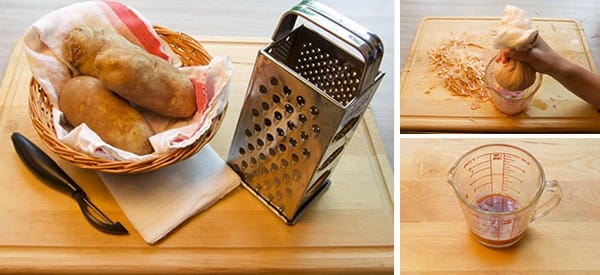
Anti-Inflammatory Diet: Potato Juice
Plants offer us a cornucopia of nutrition and medicine. Many times, these categories tightly overlap. Eating a rich, diverse diet of whole foods will set the foundations of good health, but sometimes a specific ailment or issue needs more targeted care. Chronic inflammation affects at least 40% of Americans and is closely tied to heart disease, diabetes, arthritis, and many cancers.
For any herbalist, anti-inflammatory plants play a significant role in your practice. Let potato juice be another flower in your bouquet of remedies. The tuber has numerous health benefits, culminating in an effective solution to chronic inflammation. Get on track to good health by nourishing your body with plants.
Potato juice offers a natural remedy for chronic inflammation with its anti-inflammatory properties. Read on to learn more about the nutritive benefits of potato juice and a simple recipe for making your own at home.
Benefits of Potato Juice
As a food, potatoes can often be lumped in the category of empty carbs. However, this is far from the truth. From a nutritional standpoint, potatoes are high in vitamin C, vitamin B6, potassium, and manganese. Juicing potatoes is an efficient way to concentrate these nutrients and quickly absorb them into your body. When cooked, the heat denatures many of these vitamins. Therefore, consuming raw potato juice is the most effective way to reap the benefits of the tuber’s diverse nutritional profile. Here, we review some of the primary nutritional and medicinal properties of potato juice.
Nutritional Benefits
Potato juice offers a wealth of nutrients. In just a half-cup serving, you can make sure you’re contributing to your daily intake of these vitamins and minerals.
Vitamin C
Also known as ascorbic acid, vitamin C is a necessary part of holistic wellness. The antioxidant protects your cells against free radicals and is critical for the health of most body tissues. Commonly thought to protect against viruses like the flu or cold, vitamin C can boost immune health. Additionally, it has been linked to improving cardiovascular health and skin health. A half-cup serving of potato juice contains around 60 milligrams of vitamin C.
Vitamin B6
Good for the brain and weight management, vitamin B6 benefits the central nervous system and your metabolism. Because it is water-soluble, your body can’t store any of this vital nutrient. As such, it’s critical to meet your need for vitamin B6 every day. Potato juice can help you meet the daily recommended dosage of 1.2 milligrams.
Potassium
Potatoes have an impressive amount of potassium, and the mineral does much more than you might think. Once absorbed into your body, potassium is distributed among your cells. Working as an electrolyte, potassium regulates the amount of fluid that passes in and out of your cells. While this may seem inconsequential, regulating fluid balance affects the nervous system, heart health, and muscle function. As a result, a potassium-rich diet can reduce blood pressure, prevent strokes, and reduce sodium levels.
⇒ A Time-Tested Remedy Our Grandparents Used to Make (Video)
Manganese
Manganese is another crucial mineral for a healthy functioning body. Similar to potassium, we only need trace amounts of manganese from our diets, but, without it, our bone health, metabolisms, and blood sugar levels may suffer. Preliminary research suggests that manganese can help your body regulate insulin.
Nutrients Provide Antioxidants
Aside from a rich nutritional profile, many of the chemicals found in potatoes are antioxidants. Antioxidant and anti-inflammatory are two buzzwords in the health food microculture, but what do they really mean?
Antioxidants protect your body’s cells against free radicals. Though “free radicals” sound like something from the ‘60s, they are harmful compounds that damage cells. They are linked to both cardiovascular disease and cancer. As such, antioxidants are critical to keeping your body healthy and vibrant and generally support immune health. Research has revealed a wealth of antioxidants in potato juice (Vitamin C is one of them!).
An Anti-Inflammatory Gold Mine
Anti-inflammatory foods contain immune-boosting compounds that reduce chronic inflammation in your body. Both antioxidants and polyphenols have anti-inflammatory effects. Potato juice contains high amounts of chlorogenic acid, in addition to antioxidants. Chlorogenic acid (CGA) is a polyphenol with anti-carcinogenic, anti-diabetic, and anti-inflammatory properties.
So when you squeeze the juice from potato pulp, you’re left with a rich slurry of antioxidative nutrients.
How to Make Potato Juice
Making potato juice at home is quite simple. There are a few different ways to do it. Of course, if you have an electric vegetable juicer, just pop in the potatoes and turn it on! However, not everyone has a juicer. In that case, it’s simple to juice potatoes manually using the materials found in most kitchens. Here, we provide the steps for that process.
You will need:
- 2-3 Russet Potatoes
- Vegetable Peeler
- Box Grater
- Cheesecloth or linen towel
- Bowl or measuring cup
Steps
- Peel potatoes. To avoid any potential solanine poisoning, peel the potatoes to expose the flesh. If you’re sure the potatoes have been stored correctly and have no sign of green, feel free to keep the skins on.

- Grate the potatoes. Turn your potatoes into pulp by grating them in a box grater.

- Prepare your juicer. If using cheesecloth, fold it over itself several times until it’s thick enough to filter out fine particles. Lay the cloth (or towel) over your bowl or measuring cup, and scoop about a cup of potato pulp into the cloth.

- Juice the potatoes. Wrap the potato pulp in the cloth and squeeze it into the cup. Work in sections, squeezing one scoop of pulp at a time. Once you’ve wrung out all the juice, discard the pulp and add another scoop until all the pulp has been juiced.

- Drink. Stir and drink the potato juice immediately. Many of the starches will start to settle at the bottom. This silt contains most of the nutrition benefits, so give it a quick stir and chug it down!

Potato Juice Tips
Alone, potato juice can be quite bitter. If you don’t mind a swig or two of the astringent stuff, then it’s perfectly fine to consume on its own. However, if you like to disguise the less appealing flavors, combine them with carrot and apple juice.
Side Effects and Warnings
While potato juice has plenty of benefits, it should be used in moderation. When consumed in excess, potato juice can harm the GI tract. Raw potatoes contain a protein called Lectin, which can bind to carbohydrates and make them hard to digest. If you drink too much Lectin, it can cause an upset stomach to the point of vomiting.
You may also like: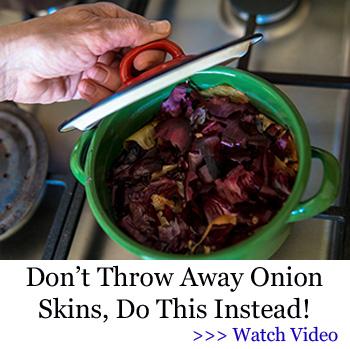
Homemade Healing Broth from Vegetable Scraps
The Plants The Cherokees Used For Pain Relief (Video)
DIY Onion Juice To Burn Belly Fat

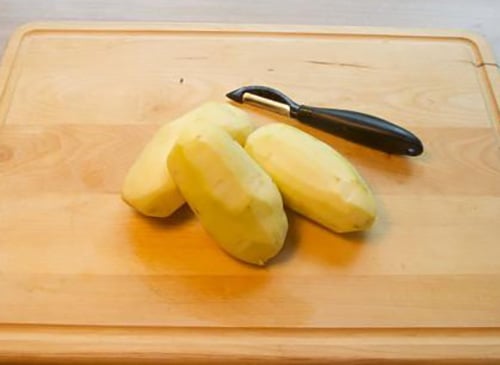
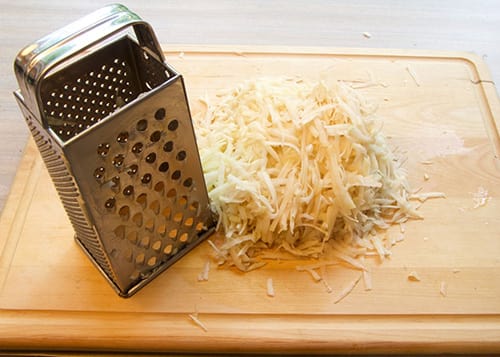
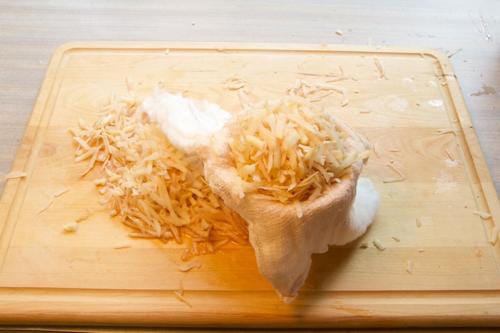
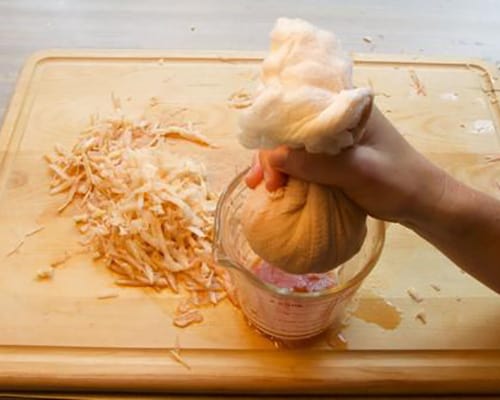
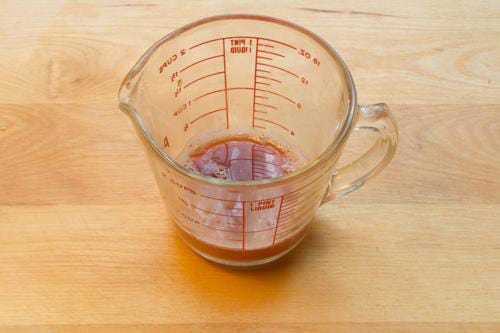
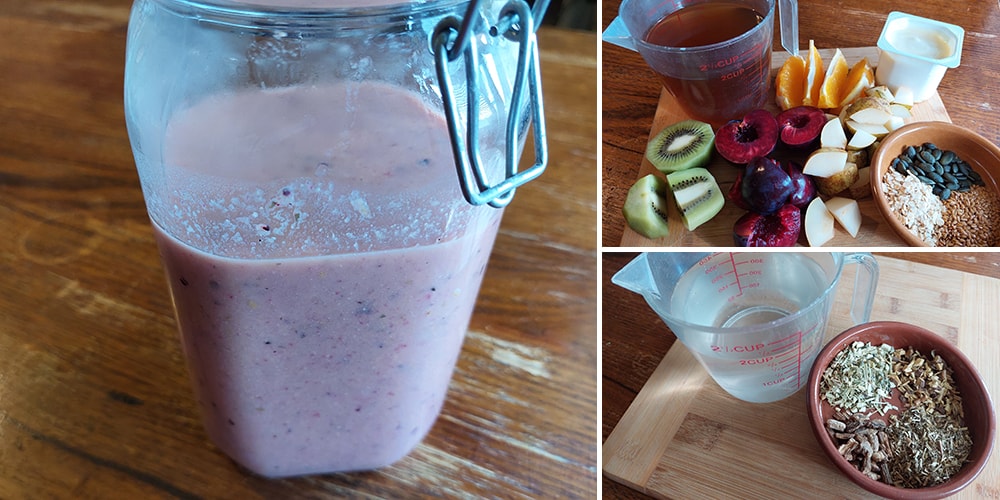
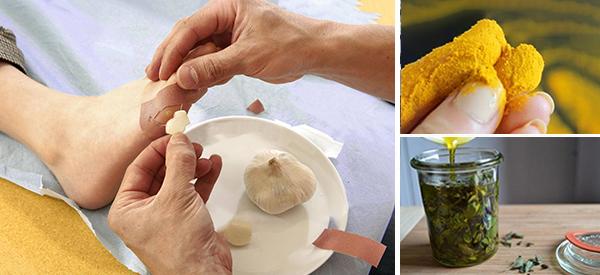
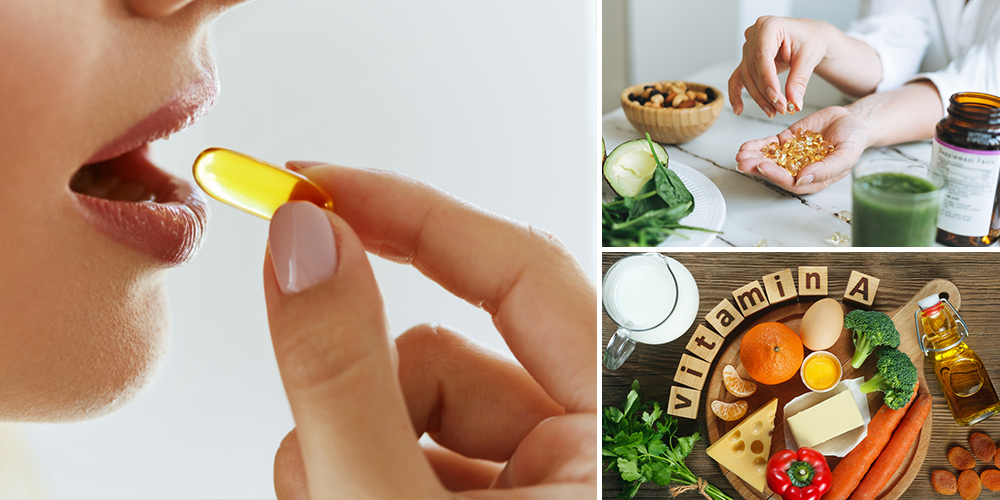
Why is the potato pulp being discarded? Instead of juicing the potato, can a raw potato be eaten to get the same benefit?
I don’t know f,or sure and agree it seems like too much work, but probably something to do with juicing vs. smoothies: smoothies slow down absorption of sugar due to the fiber but also slow down absorption of nutrients whereas juicing does the opposite…faster absorption of both.
Great question. Try it and see if it works.
Actually, this is how you make potato latkes, so use the potatoes for latkes and drink the juice.
The potato and other nightshades have solanine in them which will make a person very sick or even poisoned depending on the amount and size of the person. So please don’t eat raw potatoes.
Really? We ate raw potatoes all the time when we were young. Whenever mum made anything with potatoes we were always given a chunk to eat. Do not tecall ever being ill.
Silly. I used to eat raw potatoes all the time as a child. Not a lot, but probably at least 1 whenever I did it…I’m still here at 69.
Hello Andy,
Solanine and lectins, two compounds found in raw potatoes, can cause gastric distress and possibly make you sick. Furthermore, raw potatoes contain resistant starch, which makes digestion difficult.
Also, the taste and texture of raw potatoes make them difficult to eat.
Many blessings and good health!
Potato lectin will bother blood types O & A.
Potato lectin will not bother blood types B & AB.
This info is in the book Eat Right for Your Type by Dr. Peter J. D’Adamo.
If you know your blood type then you should get this book and adjust your diet to your blood type. If you don’t know your blood type then you should find out. Donate some blood or check your dog tags.
I am not sure if cooking the potato destroys the bad potato lectin.
Thank you, Tom. I read Dr. D’Adamo’s book and began following his advice. Since then, my digestion has improved dramatically.
I had a cyst on my shoulder for 30yrs. Irritated it while doing weight machine, applied potato poultice, included carbon, took 4 days of two changes a day, a hole opened up and out came a blob, healed within a week to 10 days…documented the entire wound forming and healing process…the body is truly a miraculous functioning food processor and dis-ease dispeller.
I have cysts in my knee so I’d like to try the potato poultice. I don’t understand the ” included carbon”
Anyway you can give me more details?
Thank you!
Hello Dorina,
You can check out our activated charcoal poultice recipe:
https://thelostherbs.com/how-to-make-an-activated-charcoal-poultice/
Many blessings and good health!
Hello Christopher,
Thank you so much for sharing your story with us. We’re glad to hear that herbal remedies helped with your issue.
Many blessings and good health!
Fascinating! Thanks for sharing.
can you cook the juiced out potatoes instead of discarding them? It seems such a waste.
Hello Jeffrey,
Thank you for your question. Yes of course you can put the pulp to good use too. You could turn it into delicious hash browns.
Many blessings and good health!
can we use a juice extractor?
Hello Spyros,
Yes, of course! If you have a juicer that’s great!
Many blessings and good health!
Don’t discard the potato pulp!
Put 1 tablespoon of olive oil and one tablespoon of butter in a cast iron skillet. Once hot, add the potato pulp. After cooking for 6 minutes on med-high heat flip the potatoes and cook for 6 more minutes – then enjoy your hash browned potatoes!
Hello Doug,
Thank you so much for sharing your recipe with us!
We really appreciate it!
Many blessings and good health!
Recently I learned about the chemical used on potatoes (Chlorpropham) that has been used on several of the foods that we eat. Unless I grow my own I no longer eat the skins of store bought potatoes.
How often do you drink this? Also how much and why? Example: cancer, blood sugar or just a preventative?
Potato juice is alkaline will reduce the acidity in you joints and very good for gout
I have an older book from doctor Vogel and that’s vat he recommande not very nice to drink but you can mix it in your soupe not to be use for to long
the grated potato can be put in cheese cloth and used as a poultice for inflammation